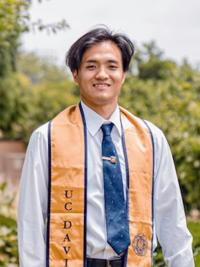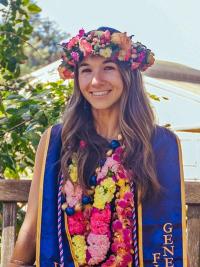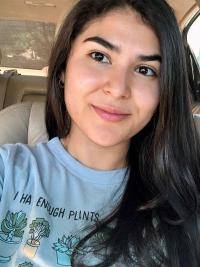
Rikiya Hatano
International Agricultural Development
Class of 2024
Research Interests
Since many of the classes I took covered both development and sociology aspects, the topics of the papers and final projects I worked on mainly focused on social issues such as food insecurity, housing problems, intersectionality, and environmental justice.
What do you enjoy most about your major?
I feel a strong sense of solidarity among IAD students as it is a small major. This makes it easier for us to exchange useful information about seminars, events, programs, and classes, and to make amazing friends. Additionally, our major professor, Dr. Amanda Crump, and our major advisor, Honora, are very supportive and dedicated to students' academic success. I love the atmosphere in the IAD program!
What are your future plans?
I'm currently interested in serving with JOCV, a program similar to the Peace Corps but conducted by the Japanese government, for two years. After JOCV, I plan to attend graduate school to pursue a Master's degree. Following that, I hope to work for international organizations such as the FAO to empower farmers and address food insecurity and poverty around the world. Eventually, I want to improve my home country, Japan, by applying the experiences I've gained throughout my career.
Favorite Classes or Professors and why?
There were many interesting classes in the IAD major, making it hard for me to choose favorites. Among them, my top picks are IAD103 and IAD170 with Dr. Crump, as well as CRD153A with Dr. London and Dr. Erbstein. In the IAD classes, I particularly enjoyed assignments like the policy brief in IAD103 and the budget proposal in IAD170. These assignments were challenging but gave me practical experience in researching information and writing these types of documents. CRD153A is a course designed for a study abroad program in Nepal. I took it during the fall quarter and traveled to Nepal over winter break to work on a community development project. It was a highly rewarding experience which allowed me to learn about Nepali culture and customs, collaborate on the project with local community members and Nepali university students, and share enjoyable moments with them. And of course Dr. Crump, Dr. London and Dr. Erbstein are amazing professors!
What advice would you give to an incoming IADer?
I strongly recommend gathering as much information as possible about campus resources and career opportunities. For campus information, follow social media accounts of campus resources, organizations, and clubs. You can also subscribe to newsletters from departments and campus organizations which are accessible on their websites. Regarding careers, I highly recommend seeking internships or researching your career interests during your sophomore or junior year, especially if you are a transfer student. Many nonprofit and government organizations offer internships related to IAD topics. The earlier you gather information and take action, the higher the likelihood you will achieve your future goals. Most importantly, don’t underestimate your potential and don’t be afraid to make mistakes. Just give it a try if you’re interested. There’s always a chance, and all experiences help you grow!

Nyah Mallak
International Agricultural Development
Class of 2024
Research Interests
I am very passionate about cacao production and technologies, as well as understanding local food systems and how they can grow to be more self-sustainable and resilient.
What do you enjoy most about your major?
IAD immediately captivated me because of how interdisciplinary it is. This is a field of study that blends many important concepts and disciplines together to ultimately create a holistic approach to working in global agriculture systems. When I was coming into college, I was torn between studying plant sciences, international relations, and economics, and soon enough I found that I could do all of those in IAD. I also feel that studying IAD makes complex global and agriculture issues more approachable and allows students to become problem solvers in ways that other majors cannot.
What are your future plans?
I will continue studying IAD at the Master's level starting the fall of 2024, and there I plan to narrow in more on cacao and innovating technologies that will be accessible to small-scale producers and hopefully improve their yield, quality, and access to better markets. Long term, I see myself pursuing IAD and/or working for import-dependent groups to improve their agricultural self-sufficiency. I also dream of having my own cacao business ... we will see.
Favorite Classes or Professors and why?
I absolutely loved all of the Plant Sciences classes, especially those where we worked on the student farm, in greenhouses, or in the labs. Luckily, IAD involves many hands-on courses so there is an endless list of "favorites." In terms of professors, Dr. Amanda Crump will always have my heart, as well as Dr. Jeffrey Mitchell. Both of these professors share so much knowledge with their students and aren't just passionate about the subject but in helping the students learn as well. I also think that Dr. Cameron Pittelkow and Dr. Diana Aramburu (Spanish department) are awesome professors.
What advice would you give to an incoming IAD Scholar?
Ask questions! You absolutely are not the only person with that question so ask it. Not only does it clarify things for you and others but it shows professors that you are listening and interested, and this will go a long way. Also, go to class. The quarter system is fast and you can easily get left behind so for your own good, you should go to class.

Deysi Alvaro Ceja
Plant Sciences
Class of 2024
Research Interests
I am interested in plant breeding and genetic engineering.
What do you enjoy most about your major?
What I enjoy the most about my major are the opportunities to conduct hands-on research in the lab.
What are your future plans?
I plan to do a master's in plant breeding with Dr. Allen Van Deynze.
Favorite classes or professors, and why?
My favorite classes are PLS 100A (Metabolic Processes of Cultivated Plants), PLS 100BL (Growth & Yield of Cultivated Plants Laboratory), PLS 154 (Introduction to Plant Breeding), BIT160 (Principles of Plant Biotechnology), and PLB 117 (Plant Ecology). These classes have allowed me to delve deeper into my research interests and gain valuable knowledge and skills that will benefit me in my future studies and career.
What advice would you give to an incoming Plant Science Scholar?
I advise incoming students to take advantage of the diverse range of classes and the research opportunities available within Plant Sciences. It's important to explore different areas of interest to discover new passions and potential career paths. In addition, building relationships with professors and peers can provide valuable support and networking opportunities.
